Mitred Conure (Mitred Parakeet): Bird Species Profile
The snappy green and red mitred conure is an exuberant, small-to-medium-sized parrot that loves to play and has the talent to become a good talker. It is a very active bird, curious about the world, comical, and eager to explore. It can also be somewhat temperamental and can be prone to nipping. It will scream if denied the attention it wants and needs. This may not be a great bird for a beginner, an owner sensitive to noise, or an apartment dweller with nearby neighbors. Like watchdogs, mitred conures are magnificent "watch birds" due to their piercingly loud alarm calls when approached by strangers.
Species Overview
Common Names: Mitred conure, mitred parakeet, red-headed conure
Scientific Name: Aratinga mitrata
Adult Size: One of the largest of the conures, measuring 13 to 15 inches in length, weighing about 7 ounces
Life Expectancy: 20 to 30 years
Origin and History
The mitred conure is native to the South American Andes Mountain region including north-central Peru, Bolivia, and northwestern Argentina. It typically inhabits high-altitude forests located 3,000 to 11,000 feet above sea level. This species has been introduced to California, Florida, and Hawaii, where they are sometimes considered a nuisance due to the crop damage they can cause.
Temperament
Tame, hand-fed mitred conures can make affectionate family pets when given plenty of love and attention. Mitred conures are a good choice for owners who enjoy spending time interacting with a pet bird. This bird will need at least two to four hours of exercise, interaction, and social time with you per day.
As with any pet bird, mitred conures have their moods. And, like other conure species, this bird can get nippy. For this reason, a conure is not the best pet for households with small children, but they can make good family pets in homes with older children who understand how to handle and respect birds.
Mitred conures that are well socialized can still get loud. You can expect noisy screeching, screams, and squawking during the dawn and dusk periods.
Clownish by nature, this species is intelligent and may perform tricks to gain your attention and affection.
Speech and Vocalizations
Conures are among the most talkative parrots. Mitred conures will amaze you with their grasp of words and phrases. Their high-pitched voices often make them sound funny and unintelligible. This doesn’t stop them from being chatty and fun little talkers with their murmurs and trills.
Mitred Conure Colors and Markings
A mature mitred conure is vivid green with spots of bright red on its face, head, neck, and the top half of its legs. It has a bare white ring around the eyes with a horn-colored beak and gray feet. Males and females are identical in color. It can be difficult to distinguish it from its close relative, the cherry-headed conure. The main difference between them is that the mitred is missing the bright red spot on the bend of the wing.
Caring for the Mitred Conure
A mitred conure needs a substantially-sized cage with at least a 24-inch square footprint and 36 inches in height at the minimum. Provide perches that are rated for strong chewers and change them frequently to prevent the bird from getting bored. Mitred conures are athletic birds that should also have a play area or gym stand outside its cage.
These birds love to bathe and can be showered with a spray bottle or under a sink sprayer regularly.
All conures are flock-oriented birds. Be prepared to fill in as the role of the bird's flockmate. They require activities and mental stimulation to prevent boredom and the behavior problems that come from neglect. Bored or lonely conures may bite you, chew unapproved items, or scream. Plan to socialize with your bird at least two hours per day. A great activity is teaching the bird to mimic words and phrases. A bird that learns a lot of words is a bird that is less inclined to scream.
Common Health Problems
The mitred conure, like other conures, is a relatively hardy bird compared to other parrots. But it is prone to some of the same health issues that affect other conures:
- Aspergillosis (fungal respiratory infection)
- Candidiasis and psittacosis (bacterial infections)
- Cold, allergies, and sinus inflammation
- Feather plucking
- Pacheco's disease (deadly viral infection)
If a bird gets bored or feels neglected, it may start a self-mutilating behavior of feather plucking. Have your bird checked by an avian veterinarian annually or if your bird starts acting lethargic, stops eating, or seems unusual to you.
Diet and Nutrition
In the wild, mitred conures feast mostly on fruit, nuts, and seeds. In captivity, they function best on a balanced, pelleted diet supplemented with fresh fruits, vegetables, and occasionally, nuts. Feed fresh food and water daily.
Exercise
As with all birds, proper exercise is imperative to a mitred conure's good health. Mitred conures are very active and inquisitive, and they need adequate space to fly, explore, and play. Your mitred conure should be allowed sufficient time out of his cage every day for supervised playtime. This bird is at its best when it has four hours of free flight time out of the cage in a safe space daily.
Like all parrots, mitred conures need to chew and should have plenty of sturdy play toys to gnaw on. Toys help channel its gnawing instinct in a positive direction and provide good mouth exercise.
Can be affectionate with their owner
Intelligent, can be taught tricks and to speak
Acts as a good stranger alarm
Noisy periods at dawn and dusk
Requires at least two to four hours of exercise, socialization
Tendency to be nippy
Where to Adopt or Buy a Mitred Conure
If you want a mitred conure, check with animal rescue organizations and adoption societies. Mitered conures are such loud birds that some owners who can't deal with the noise may give up their birds.
Some adoptions or rescues that may have mitred conures include:
- Rescue the Birds
- Bird Breeders
- Petfinder
Although aviary pet stores may have mitred conures, a bird breeder is usually a better option. The average cost is from $500 to $2,000. The Beauty of Birds is an organization that maintains a directory of reputable parrot breeders in the U.S. If you are looking for a bird breeder, interview the breeder, look at the general health of their birds, check out their living conditions, and talk to past customers. Signs you should avoid the breeder include cramped living conditions, inactive birds, and breeders who avoid your questions or do not seem to offer much information.
More Pet Bird Species and Further Research
If you’re interested in similar species, check out:
- Green-cheeked Conure Species Profile
- Sun Conure Species Profile
- Cherry-headed Conure Species Profile
Also, you might want to review our profiles of other medium-sized parrots.
RECOMMENDED NEWS
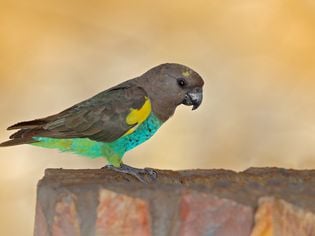
Meyer's Parrot Species Profile
Meyer's parrots are small, stocky birds that are closely related to the Senegal parrot. They ar...
Read More →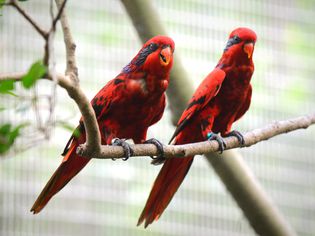
Red Lory (Moluccan Lory): Bird Species Profile
The Red Lory (Eos bornea), also known as the Moluccan Lory, is a small parrot with a big personal...
Read More →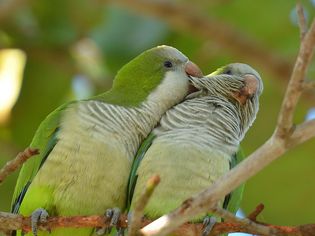
Quaker Parrot (Monk Parakeet): Bird Species Profile
Quaker parrots (or monk parakeets) are known for their charming, comical personalities and their wi...
Read More →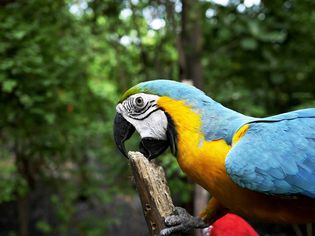
How to Stop Your Parrot From Biting
Biting parrots are far more common than you may think. All pet birds bite. While this is not to say...
Read More →
Do Birds Need Annual Vet Visits?
Question: My Budgie, Kipper, is only a year old, and I just adopted him last week. A friend of min...
Read More →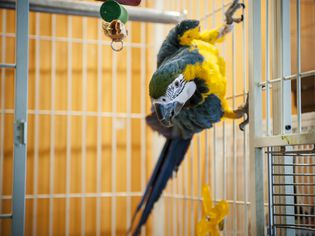
Bird Poop Identification Chart
Most bird owners have heard that it's important to monitor their feathered friend's droppin...
Read More →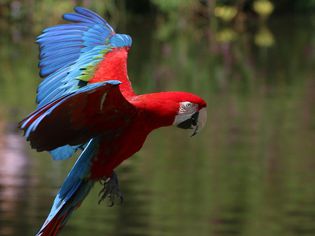
Green-Wing Macaw (Red and Green Macaw): Bird Species Profile
Second in size only to the hyacinth macaw, which is the largest parrot species, the green-wing maca...
Read More →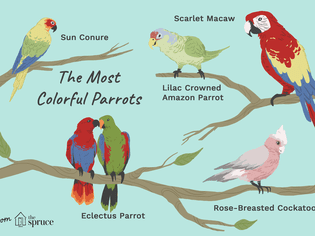
8 Top Colorful Parrot Species
For many people, the first thing that draws them to bird ownership is a parrot's colorful feath...
Read More →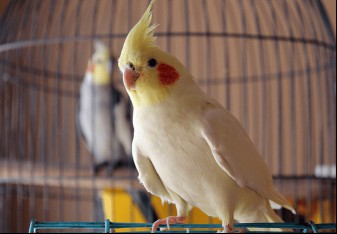
12 Friendly Pet Bird Species
The best pet bird, especially for a beginner, is friendly, gentle, and well-suited to being a compa...
Read More →
Comments on "Mitred Conure (Mitred Parakeet): Bird Species Profile" :